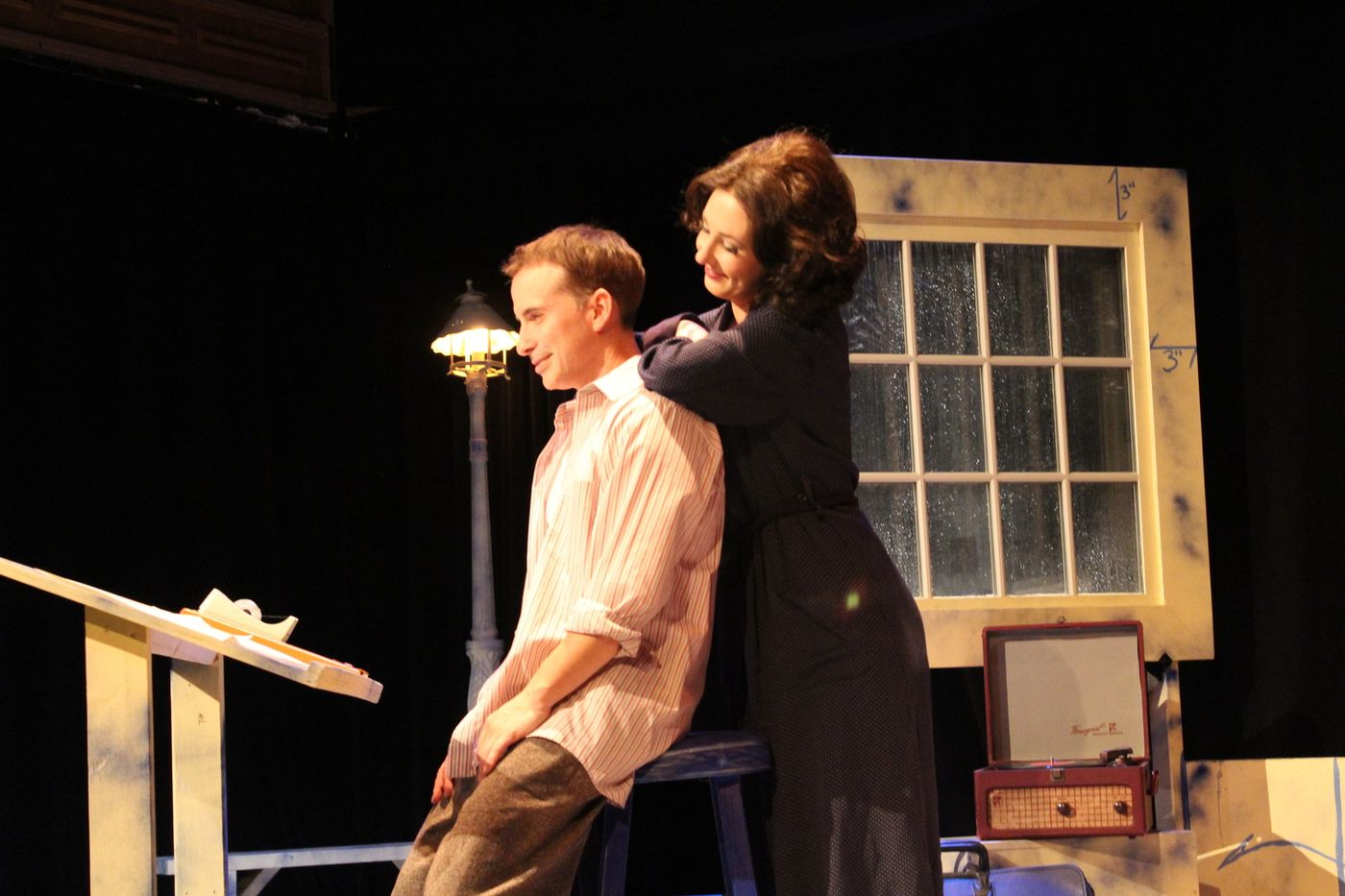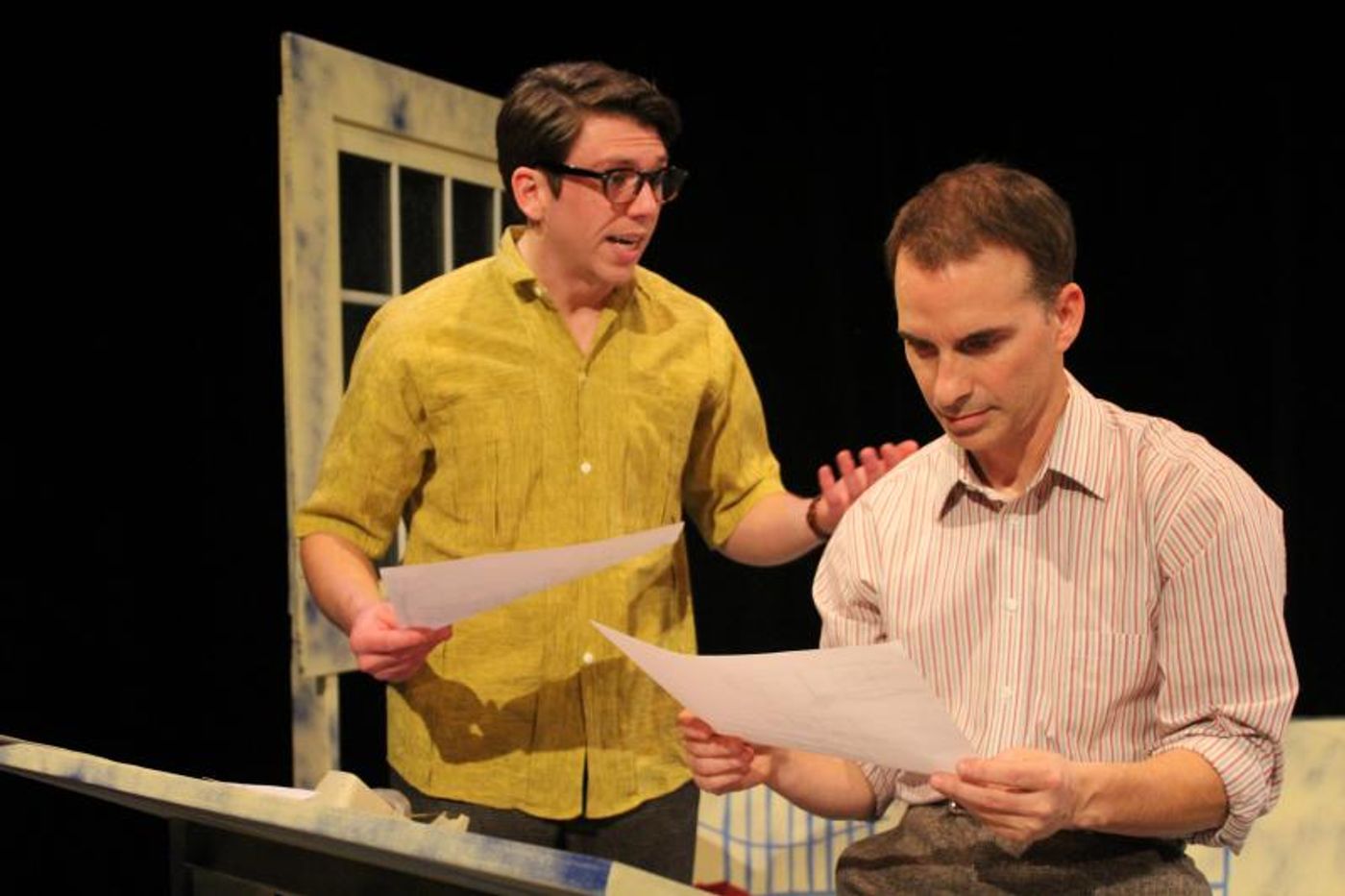Review: Charlotte's Off-Broadway Poignantly Pieces THREE DAYS OF RAIN Together

At a pivotal moment in the opening act of Richard Greenberg's THREE DAYS OF RAIN, Walker Janeway pounces on a sentence in his dead father's journal that only becomes visible in a certain slant of light - a stain that turns out to be words. Written by celebrated architect Ned Janeway shortly after the untimely death of his business partner, Theo Wexler, the phrase leads Walker to believe he has found the answer to why his father's will divided his estate so shockingly.
There's a bit of a cosmic joke that Walker is playing on himself here, but we don't get to see it until deep into Act 2, which takes us back 35 years to 1960. In the same loft where Walker pored over Dad's journal, we encounter Ned, Theo, and Lina, the woman who is torn between them. These are the parents of the people we've met at the start - Walker, his best friend Pip, and his sister Nan. And they're the same actors, so you'll catch the resemblance.
What Walker gets wrong is the true object of that wee stain of a sentence. He presumes it refers to all the world-famous buildings and homes conceived by the Wexler-Janeway architectural firm with their genius designs. Turns out that Lina, Nan, and Walker himself were more likely at the heart of what Ned was getting at.
"Everything," you see, can mean a lot of different things.
Probably because all eyes were on Julia Roberts when THREE DAYS OF RAIN made its Broadway debut in 2006 (nine years after its original run at Manhattan Theatre Club), more than a couple of critics were as off-target as Walker in their suppositions when they sleuthed out the point of it all. Restoring the original balance of the script, which centers its concern on the relationship between Walker and Ned, the current Charlotte's Off-Broadway production at Spirit Square enables us to see more clearly.
Sure, it might be tempting conclude that THREE DAYS OF RAIN demonstrates how narrowly children know their parents, flipping the plot of King Lear. Yet this production at Duke Energy Theater, so meticulously directed by Paige Johnston Thomas, reveals all of the pains Greenberg went to in making sure that Walker and Nan are exceptionally ignorant of their parents' relationship and inner lives. So is Pip, vis-à-vis his dad.
We hear early on from Walker that his dad was nearly mute throughout his childhood, though we don't learn why until we meet Ned after intermission. As for Lina, she has been strung out on drugs and/or insane since Walker was eight years old. Perhaps Walker could have gained some additional insights if he had attended Dad's big A-list funeral and listened to the eulogies, but he skipped that, preferring to brood artistically in Italy for a year. Add to those deprivations the usual distance between fabulously wealthy parents and their kids - both of whom are free to globetrot when the impulse hits - and you can see why the journal that Walker discovers at the fateful loft is like a precious canteen filled with water that surfaces in the vast Sahara.
Ryan Maloney's set design has a loosely precise look, like a blueprint drawn free-hand. Even in its abstractness, the design doesn't destroy the workshop vibe of the loft. From the moment he appears on these hand-drawn quadrangles, Brian Lafontaine delivers a beautifully calibrated performance as Walker. You might look back, when it becomes obvious that he's a snooty, shiftless, and irresponsible underachiever - with sprinklings of self-pity and hypochondria - and think that Lafontaine was a little too genial and yielding at the start.
Yet he's not only speaking to us for the first time, he's also meeting up with Nan for the first time since he disappeared without telling anyone where he was going. During his yearlong absence, Nan had come to terms with the probability, after hired detectives came up empty, that her brother was dead. So a bit a caution and contrition must be stirred into Walker's Bohemian mix. Especially since he has forgotten that he was supposed to rendezvous with Nan at the airport. Ooops.
The meanness and arrogance of the man, peppered with resentment and delivered with some nasty sarcasm, come out after the disposition of the estate, when Walker comes back to the loft. Now the brunt of his attention is directed at Pip, who has drawn the one property that Walker cherished most. Pip actually offers a more plausible reason why this has happened: he had actually established a normal speaking relationship with Ned. But watch the seething, stony way that Lafontaine absorbs this and other revelations from his friend. He's not much of a listener.
As for Lafontaine's work on Ned, it may stand as the best he has given us in over 25 years on Charlotte stages, surprisingly effortless and touching at the end. Who saw this all winding up like a bittersweet romantic comedy after the fire that brought us to intermission? Restoring Lina to lifesize, Caroline Bower is a huge reason why the Act 2 denouement is so poignant and satisfying. In the opening act as Nan, Bower is far more subtly nuanced, demonstrating how the role can bloom with a real stage actress.
Nan is the offended normal sib who has the right to be absolutely disgusted with her brother's inconsiderate flights, but if you closely watch her reaction to his blather, you'll see that she momentarily drops her front of stern reproach, charmed and loving in spite of herself. There's a parallel ambivalence in her attitude toward Pip, hints thrown our way when he appears in the second scene, fireworks ready to explode when the reason is disclosed in the Act 1 climax.

If Lafontaine and Bower embody one of the chief satisfactions of a vibrant local theatre scene, watching familiar professional performers radically transforming themselves into new roles, Chris Speed personifies the excitement a newcomer brings. After his richly textured accounts of both Pip and Theo, I can hardly wait to see what he does next. Pip realizes that, making his living as a soap opera stud, he is little more than a thin shadow of what his great father was. But he's cool with that, though he seethes at Walker's perpetual hypochondria and condescension, helping to bring the 1995 action so nicely to a boil.
Less open to the charge of superficiality - because he has loftier ambitions - Theo is like his son in his charismatic ability to navigate his career path. Yet he's as undervalued when we see him in 1960 by Ned and Lina as Pip will be by their children 35 years later. We need to piece it together, connecting Theo's final exit with the story Pip has told about him in Act 1, to realize that he's really the best person we see, more than worthy of the barely legible tribute that Ned has written to him in his journal.
While Ned was reticent as a father after his disloyalty to his best friend, Theo was devoutly secretive with his wife and son, keeping hurts hidden that only Ned and Lina could have suspected. Speed does an excellent job of making the virtues of both Wexlers mesh together as a family trait. I found that Theo's last walk into the wings, huddled in a trench coat on the last of Greenberg's three days of rain, lingered long in my memory.
One other little signpost to catch in Act 2 - one that Greenberg himself pointed to in a 1998 interview with American Theatre magazine - when measuring Ned's actual attitude toward his son against Walker's perception. Ned expatiates at length on his desire to abandon architecture and become a flaneur, a loafer who strolls idly around town. "I find it moving," said Greenberg, "that the father would name him after what he loved."
And I find it ironic that, in the upshot of Walker's life until we get our last glimpse of him, a father's blessing has become a curse.
No, the point isn't just that we narrowly know our parents. That's taking Greenberg's drama rather obtusely, for Pip lost his father at the age of three! Time after time, these young people who are so familiar with each other prove to utterly misjudge one another. They know each other narrowly and, on top of that, know themselves narrowly in different ways. So eventually, THREE DAYS OF RAIN and old King Lear actually intersect.
Reader Reviews
Videos

